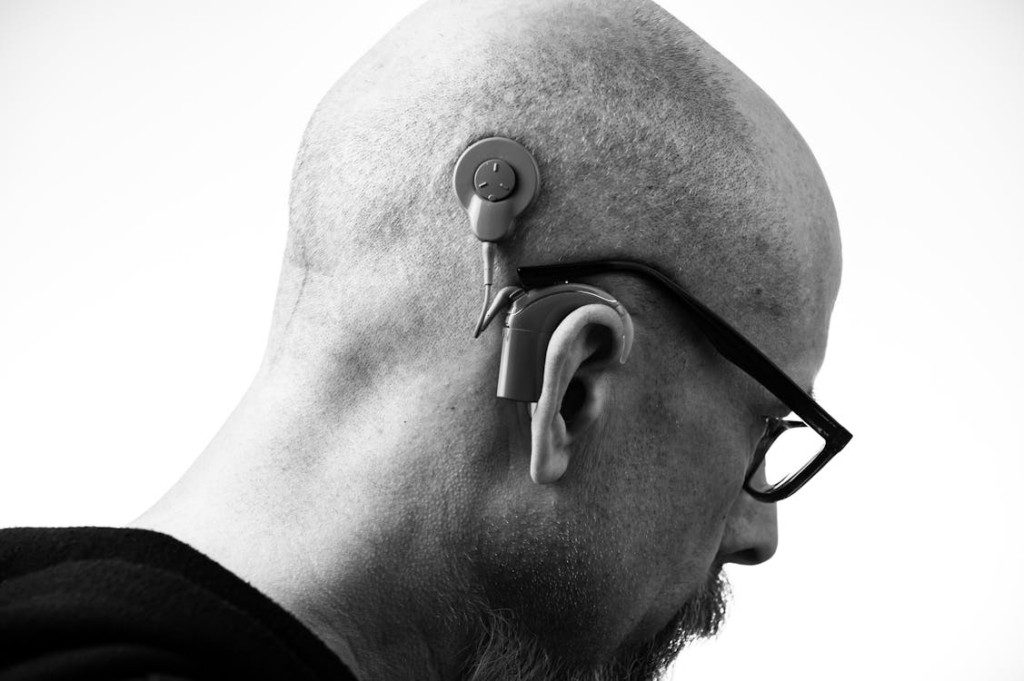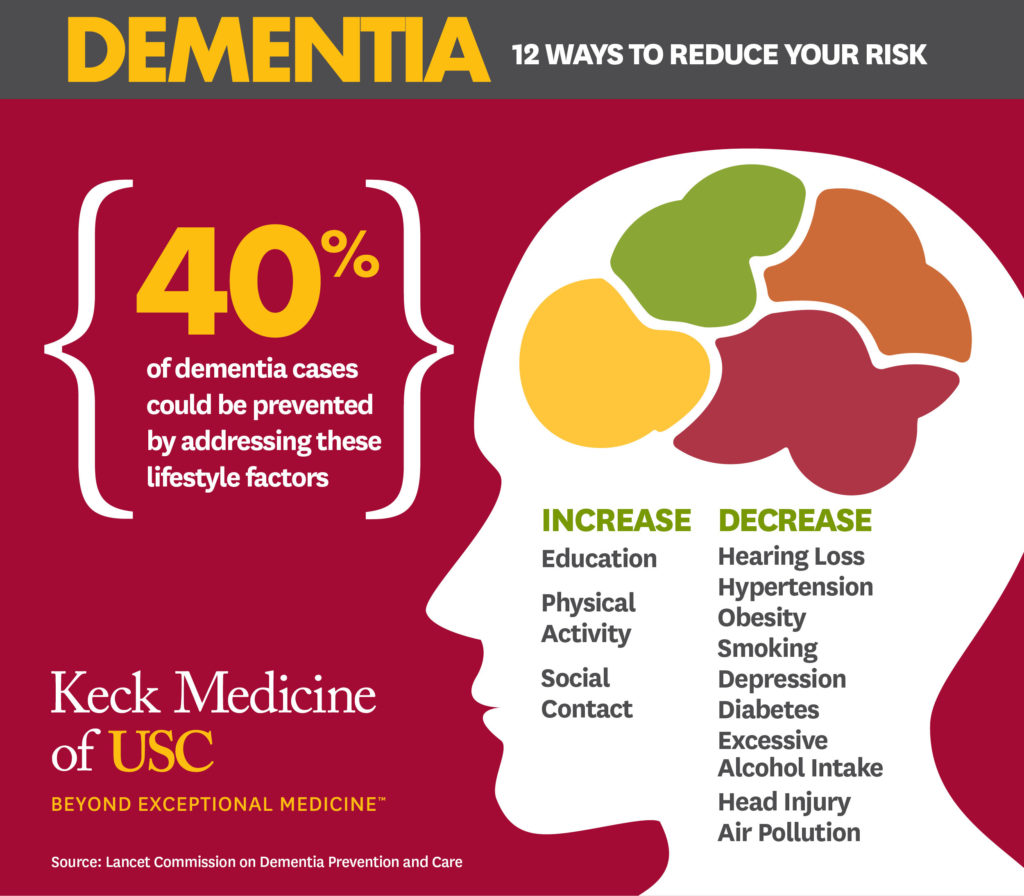According to the World Health Organization (WHO), around fifty million people worldwide have dementia, and about ten million more cases are added every year [1]. This is why preventing dementia is so important. Despite how common it is, dementia is not a part of normal aging, and it has a physical, psychological, social, and economic impact on the affected individual, their families, caretakers, and society as a whole. A significant amount of research over the last several decades has gone into uncovering the causes of dementia in an effort not simply to treat the condition but to prevent it altogether. New updates have recently been added to The Lancet Commission on dementia prevention, intervention, and care, which have defined twelve risk factors that could be modified over a lifetime to prevent or delay forty percent of dementia cases [2].
Modifiable Risk Factors for Preventing Dementia

In 2017 The Lancet Commission identified nine modifiable risk factors for preventing dementia, which included the following:
Read More: Light and Sound Therapy Shows Potential for Treating Alzheimer’s Disease
1. Education

Individuals with lower levels of education may have less cognitive reserve, making them more susceptible to dementia later in life. Access to education equips people with cognitive skills and provides opportunities for intellectual stimulation, which can help build resilience against cognitive decline.
2. Hypertension

High blood pressure can damage blood vessels in the brain, leading to reduced blood flow and oxygen supply, which increases the risk of cognitive impairment and dementia. Managing hypertension through lifestyle changes and medication can help mitigate this risk.
3. Hearing Impairment

Untreated hearing loss has been linked to cognitive decline and dementia. The exact mechanism is not fully understood, but it’s believed that hearing impairment may lead to social isolation, cognitive overload, or changes in brain structure, all of which can contribute to cognitive decline.
4. Smoking

Smoking is associated with vascular diseases and inflammation, which can damage blood vessels in the brain and increase the risk of cognitive impairment and dementia. Quitting smoking reduces this risk and improves overall health outcomes.
5. Obesity

Obesity is linked to various cardiovascular risk factors, including diabetes and hypertension, which can contribute to cognitive decline and dementia. Maintaining a healthy weight through balanced diet and regular exercise is crucial for reducing this risk.
Read More: This 5-minute personality test that can determine your Alzheimer’s risk is shockingly accurate
6. Depression

Depression is both a risk factor for and a consequence of dementia. Chronic stress and inflammation associated with depression may accelerate brain aging and increase the risk of cognitive decline. Treating depression and maintaining good mental health are essential for overall well-being and brain health.
7. Physical Inactivity

Leading a sedentary lifestyle is associated with poor cardiovascular health, obesity, and diabetes, all of which increase the risk of cognitive decline and dementia. Regular physical activity improves blood flow to the brain, promotes neuroplasticity, and reduces the risk of cognitive impairment.
8. Diabetes

Diabetes disrupts blood sugar regulation and insulin signaling, leading to oxidative stress, inflammation, and damage to blood vessels in the brain. Managing blood sugar levels through diet, exercise, and medication is crucial for reducing the risk of cognitive decline associated with diabetes.
9. Low Social Contact

Social isolation and loneliness have been linked to cognitive decline and dementia. Engaging in social activities and maintaining strong social connections may promote cognitive health by providing intellectual stimulation, emotional support, and opportunities for social interaction.
10. Excessive Alcohol Consumption

Heavy alcohol consumption is associated with cognitive impairment and an increased risk of dementia. Chronic alcohol abuse can lead to brain damage, nutritional deficiencies, and liver disease, all of which can contribute to cognitive decline. Limiting alcohol intake to moderate levels is essential for maintaining brain health.
Read More: One Early Sign of Alzheimer’s That May Show Up Before Others (Not Memory Loss)
11. Traumatic Brain Injury (TBI)

A history of traumatic brain injury, such as concussion or head trauma, is associated with an elevated risk of developing dementia, particularly if the injuries are repeated or severe. TBI can lead to the accumulation of abnormal proteins in the brain, disruption of neural networks, and long-term cognitive impairment. Preventing head injuries through safety measures and timely medical intervention is crucial for reducing the risk of dementia associated with TBI.
12. Air Pollution

Exposure to air pollution, particularly fine particulate matter (PM2.5) and nitrogen dioxide (NO2), has been linked to cognitive decline and an increased risk of dementia. Air pollution contributes to inflammation, oxidative stress, and vascular damage in the brain, which can impair cognitive function over time. Implementing policies to reduce air pollution levels and minimizing exposure to polluted air through environmental regulations and personal protective measures may help mitigate this risk. Together these risk factors account for forty percent of dementia cases worldwide. Theoretically if these risk factors were removed, those cases could be prevented or at least delayed.

Socioeconomic Status and Dementia

In some countries, the proportion of older people with dementia has actually gone down, likely because of improvements in education, nutrition, health care, and lifestyle changes. Unfortunately, dementia is on the rise in low and middle-income countries, where around two thirds of people with dementia live. Lead author of the report, Professor Gill Livingston of the University College London, UK, explains that these populations are the biggest opportunity for lower the global instance of dementia.
“Interventions are likely to have the biggest impact on those who are disproportionately affected by dementia risk factors, like those in low- and middle-income countries and vulnerable populations, including Black, Asian and Minority Ethnic communities,” Livingston said [2].
She stressed the importance of going beyond simply promoting good health to prevent dementia, and instead address the inequalities that exist within our society that put certain individuals at a greater risk for developing the condition. “Our report shows that it is within the power of policy-makers and individuals to prevent and delay a significant proportion of dementia, with opportunities to make an impact at each stage of a person’s life,” she explained [2].
A New Approach to Preventing Dementia

Livingston explained that the risk of developing dementia can be reduced. It’s achieved by creating active and healthy environments for communities where physical activity is the norm, healthy diets are accessible, and where alcohol is minimized. The authors outlined nine ambitious recommendations for policymakers and individuals to help prevent dementia:
Read More: Could Stem Cells from Menstrual Blood Help Treat Diseases Like Alzheimer’s?
Maintain Healthy Blood Pressure

After the age of 40, individuals are advised to keep their systolic blood pressure at 130 mm Hg or less to reduce the risk of dementia. High blood pressure can damage blood vessels in the brain, leading to cognitive impairment and dementia. Monitoring blood pressure regularly and managing hypertension through lifestyle changes and medication is crucial for brain health.
Protect Hearing and Wear Hearing Aids

To reduce hearing loss, individuals should protect their ears from excessive noise exposure and consider using hearing aids if they already experience hearing loss. Untreated hearing impairment is associated with cognitive decline and dementia, making early intervention and protection essential for preserving cognitive function.
Reduce Exposure to Air Pollution and Secondhand Smoke

Air pollution and secondhand smoke exposure are linked to cognitive decline and an increased risk of dementia. Minimizing exposure to polluted air and avoiding secondhand smoke can help protect brain health. Implementing environmental regulations and adopting clean air policies are essential steps in reducing the impact of air pollution on cognitive function.
Prevent Head Injuries

Particularly important for individuals involved in high-impact sports or occupations with a greater risk of head injury, preventing traumatic brain injury is crucial for reducing the risk of dementia. Implementing safety measures, using protective equipment, and raising awareness about the importance of head injury prevention can help minimize the long-term cognitive consequences of head trauma.
Limit Alcohol Use

Consuming more than 21 units of alcohol per week is associated with an increased risk of dementia. Limiting alcohol intake to moderate levels can help protect brain health and reduce the risk of cognitive decline. Providing support programs for individuals struggling with alcohol dependence can aid in reducing alcohol consumption and promoting brain health.
Read More: The Cause of Alzheimer’s Could Be Coming From Inside Your Mouth, Study Claims
Quit Smoking

Smoking is a significant risk factor for dementia, and quitting smoking can help reduce this risk. Smoking is associated with vascular diseases, inflammation, and oxidative stress, all of which can contribute to cognitive decline and dementia. Access to smoking cessation programs and support services is essential for individuals looking to quit smoking and protect brain health.
Promote Education

Providing all children with primary and secondary education is essential for cognitive development and reducing the risk of dementia later in life. Education equips individuals with cognitive skills, critical thinking abilities, and opportunities for intellectual stimulation, all of which contribute to cognitive reserve and resilience against cognitive decline.
Manage Obesity, Diabetes, and Maintain Physical Activity

Reducing obesity and diabetes and sustaining physical activity throughout mid and later life are crucial for preserving brain health and reducing the risk of dementia. Obesity and diabetes are associated with cardiovascular risk factors that can impair cognitive function. While regular physical activity promotes blood flow to the brain and supports neuroplasticity.
Address Societal Inequalities

Societal inequalities contribute to disparities in health outcomes, including the risk of developing dementia. Addressing systemic inequalities, such as access to healthcare, education, and socioeconomic resources, is essential for reducing the disproportionate burden of dementia on marginalized communities and promoting equitable brain health for all individuals.
Recommendations for Individuals with Dementia

At the end of the report, the authors also provide recommendations for people who are already affected by the condition. They include the following:
Holistic Care After Diagnosis

After a dementia diagnosis, it’s crucial to provide holistic care that addresses various aspects of the individual’s well-being. Including physical and mental health, social care, and support. This comprehensive approach aims to enhance the overall quality of life for individuals living with dementia by addressing their diverse needs and promoting independence, dignity, and autonomy.
Read More: 19-year-old man is youngest ever patient to be diagnosed with Alzheimer’s
Maintain Physical Health

Keeping individuals with dementia physically healthy is essential for preserving their cognitive function. Physical health directly influences cognitive health, and maintaining good physical health through regular exercise, balanced nutrition, adequate sleep, and preventive healthcare measures can help slow the progression of dementia and improve overall well-being.
Use Tailored Psychosocial Interventions

Neuropsychiatric symptoms, such as agitation, aggression, depression, and anxiety, are common in dementia and can significantly impact the individual’s quality of life. Psychosocial interventions, including cognitive behavioral therapy, reminiscence therapy, music therapy, and sensory stimulation, tailored to the patient’s needs, preferences, and abilities, can effectively manage these symptoms, enhance emotional well-being, and improve overall functioning.
By implementing these recommendations, healthcare providers can offer comprehensive care and support to individuals living with dementia and addressing their physical, mental, and social needs while promoting overall well-being and quality of life.
Read More: Scientists Reveal Overlooked Midlife Risk for Alzheimer’s Disease

